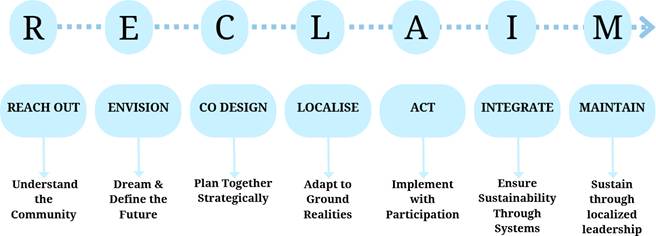In a landmark move toward sustainable development and social justice in mining regions, the Ministry of Coal has officially launched the RECLAIM Framework, India’s first structured, community-oriented approach to mine closure and transition. Developed in collaboration with the Coal Controller Organisation and the Heartfulness Institute, RECLAIM is poised to transform how coal mining regions shift toward ecological and socio-economic regeneration.
RECLAIM, which stands for a Community Engagement and Development Framework for Mine Closure and Repurposing, offers a step-by-step guide to managing the complex social and environmental changes that accompany the phasing out of coal-based operations.
Nodal Ministry:
The initiative was launched by the Ministry of Coal in partnership with the Coal Controller Organisation and the Heartfulness Institute.
OBJECTIVE:
RECLAIM aims to ensure that the transition following mine closure is just, inclusive, and tailored to the needs of local communities. It focuses on long-term sustainability and economic recovery in mining-affected areas.
India’s coal belt has powered the country’s growth for decades. But as global energy goals shift toward renewables and India pushes toward its net-zero targets, many of these mines are approaching the end of their operational life. Mine closures, if not managed properly, can lead to job losses, economic decline, and environmental degradation.
Key Features of the RECLAIM Framework
- Structured Community Involvement:
Encourages active grassroots participation throughout every phase of mine closure and transition. - Practical Tools and Methodologies:
Provides easy-to-use templates, tools, and field-tested models suited to India’s socio-economic context. - Focus on Gender and Vulnerability:
Ensures that women and marginalized groups are meaningfully included, in line with the Sustainable Development Goals (SDGs) on equity and inclusion. - Integration with Local Governance:
Works in tandem with Panchayati Raj Institutions to reinforce accountability and participatory planning at the local level. - Ecological Restoration:
Aims at restoring the environment through land reclamation, afforestation, and rejuvenation of water resources. - Socio-Economic Transition:
Promotes skill development, alternate livelihoods, and community resilience to reduce reliance on the coal economy.
Significance of the Framework
- A National First:
RECLAIM is India’s first dedicated, community-focused mine closure framework in the coal sector. - Environmental Impact:
Contributes to India’s climate resilience and net-zero targets through ecological restoration and sustainable practices. - Community Empowerment:
Redefines mine closure as an opportunity for inclusive, community-driven growth rather than merely an economic downturn.
RECLAIM is not just a policy—it’s a paradigm shift. It shows that mine closure doesn’t have to be a crisis. With the right planning and participation, it can become a springboard for new economic activities, healthier ecosystems, and stronger communities.
It’s also a major win for environmental sustainability. By focusing on land and water restoration and supporting India’s climate commitments, RECLAIM turns former coalfields into hubs of regeneration.
For the first time in India, mine closure is being viewed not as the end—but as a new beginning. And RECLAIM could be the blueprint for how we achieve that transition—justly, inclusively, and sustainably.



